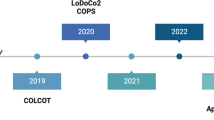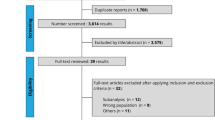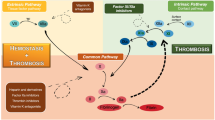Abstract
Antiplatelet therapy is critical during percutaneous coronary intervention (PCI) as it reduces the incidence of abrupt closure and distal thrombi embolization, which are significant acute peri-procedural complications likely responsible for the clinical adverse outcomes with PCI, namely death, myocardial infarction or urgent target vessel revascularization. Glycoprotein (GP) IIb/IIIa receptor antagonists, potent antiplatelet agents, have been specifically tested during PCI. There are currently three commercially available GP IIb/IIIa receptor antagonists and results from more than ten randomized clinical PCI trials have established their clinical efficacy and tolerability during coronary intervention. There remain questions regarding variability in efficacy among individual clinical trials and among population subsets, potential clinical differences among the available agents, and their optimal use. This article will critically review the body of evidence for clinical efficacy and tolerability of each individual tested compound, highlight potential differences among agents, and raise important issues involving their use in clinical practice.
Similar content being viewed by others
References
Kovach J, Mintz G, Pichard A, et al. Sequential intravascular ultrasound characterization of the mechanism of rotational atherectomy and adjunct balloon angioplasty. J Am Coll Cardiol 1993; 22: 1024–32
den Heijer P, Foley D, Escaned J, et al. Angioscopic versus angiographic detection of intimai dissection and intracoronary thrombus. J Am Coll Cardiol 1994; 24: 649–54
Tan K, Sulke N, Taub N, et al. Clinical and lesion morphologic determinants of coronary angioplasty success and complications: current experience. J Am Coll Cardiol 1995; 25: 855–65
Lincoff AM, Popma JJ, Ellis SG, et al. Abrupt vessel closure complicating coronary angioplasty: clinical, angiographic, and therapeutic profile. J Am Coll Cardiol 1992; 19: 926–35
Van’t Hof AWJ, Liem A, Suryapranata H, et al. Angiographie assessment of myocardial reperfusion in patients treated with primary angioplasty for acute myocardial infarction: myocardial blush grade. Circulation 1998; 97: 2302–6
Gibson MC, Cannon CP, Murphy SA, et al. Relationship of TIMI myocardial perfusion grade to mortality after administration of thrombolytic drugs. Circulation 2000; 101: 125–30
Gibson CM, Murphy SA, Marble SJ, et al. Relationship of creatine kinasemyocardial band release to Thrombolysis in Myocardial Infarction perfusion grade after intracoronary stent placement: an ESPRIT substudy. Am Heart J 2002; 143: 106–10
Roe MT, Ohman EM, Maas AC, et al. Shifting the open-artery hypothesis downstream: the quest for optimal reperfusion. J Am Coll Cardiol 2001; 37: 9–18
Barnathan E, Schwartz J, Taylor L, et al. Aspirin, and dipyridamole in the prevention of acute coronary thrombosis complicating coronary angioplasty. Circulation 1987; 76: 125–34
White CW, Chaitman B, Lassar TA, et al. Antiplatelet agents are effective in reducing the immediate complications of PTCA: results from the ticlopidine multicenter trial [abstract]. Circulation 1987; 76 Suppl. IV: IV–400
Leon MB, Baim DS, Popma JJ, et al. A clinical trial comparing 3 antithrombotic drug regimens after coronary artery stenting. N Engl J Med 1998; 339: 1665–71
Schomig A, Neumann FJ, Kastrati A, et al. A randomized comparison of antiplatelet and anticoagulant therapy after the placement of coronary artery stents. N Engl J Med 1996; 334: 1084–9
Bertrand ME, Rupprecht HJ, Urban P, et al. Double-blind study of the safety of clopidogrel with and without a loading dose in combination with aspirin compared with ticlopidine in combination with aspirin after coronary stenting: The Clopidogrel Aspirin Stent International Cooperative Study (CLASSICS). Circulation 2000; 102: 624–9
Laskey MA, Deutsch E, Barnathan E, et al. Influence of heparin therapy on percutaneous transluminal coronary angioplasty outcome in unstable angina pectoris. Am J Cardiol 1990; 65: 1425–9
Topol EJ. Textbook of interventional cardiology, 3rd edition. Philadelphia: Saunder (PA). 1999
Chew DP, Moliterno DJ. A critical appraisal of platelet glycoprotein Ilb/IIIa inhibition. J Am Coll Cardiol 2000; 36(7): 2028–35
EPIC Investigators. Use of a monoclonal antibody directed against the platelet glycoprotein IIb/IIIa receptor in high-risk coronary angioplasty. N Engl J Med 1994; 330: 956–61
EPILOG Investigators. Platelet glycoprotein IIb/IIIa blockade with abciximab with low-dose heparin during percutaneous coronary revascularization. N Engl J Med 1997; 336: 1689–96
CAPTURE Investigators. Randomized placebo-controlled trial of abciximab before and during coronary intervention in refractory unstable angina: the CAPTURE study. Lancet 1997; 349: 1429–35
EPISTENT Investigators. Randomized placebo-controlled and balloon-angi-oplasty controlled trial to assess safety of coronary stenting with use of platelet glycoprotein IIb/IIIa blockade. Lancet 1998; 352: 87–92
Brener SJ, Barr LA, Burchenal JEB, et al. A randomized, placebo-controlled trial of platelet glycoprotein IIb/IIIa blockade with primary angioplasty for acute myocardial infarction. Circulation 1998; 98: 734–41
Neumann FJ, Kastrati A, Schmitt C, et al. Effect of glycoprotein IIb/IIIa receptor blockade with abciximab on clinical and angiographic restenosis rate after the placement of coronary stent following acute myocardial infarction. J Am Coll Cardiol 2000; 35: 915–21
Montalescot G, Barragan P, Wittenberg O, et al. Platelet glycoprotein IIb/IIIa inhibition with coronary stenting for acute myocardial infarction. N Engl J Med 2001; 344: 1895–903
Stone GW, Grines CL, Cox DA, et al., for the CADILLAC Investigators. Primary angioplasty with or without abciximab compared to primary stenting with or without abciximab in acute myocardial infarction. N Engl J Med. In press
IMPACT II Investigators. Randomized placebo-controlled trial of effect of eptifibatide on complications of percutaneous coronary intervention: IMPACT II. Lancet 1997; 349: 1422–8
ESPRIT Investigators. Novel dosing regimen of eptifibatide in planned coronary stent implantation (ESPRIT): a randomised, placebo-controlled trial. Lancet 2000; 356: 237–44
RESTORE Investigators. Effects of platelet glycoprotein IIb/IIIa blockade with tirofiban on adverse cardiac events in patients with unstable angina or acute myocardial infarction undergoing coronary angioplasty. Circulation 1997; 9: 1445–53
Topol EJ, Ferguson JJ, Weisman HF, et al. Long-term protection from myocardial ischemic events in a randomized trial of brief integrin beta3 blockade with percutaneous coronary intervention. JAMA 1997; 278: 479–84
Lincoff AM, Tcheng JE, Califf RM, et al. Sustained suppression of ischemic complications of coronary intervention by platelet GP IIb/IIIa blockade with abciximab: 1 year outcome in the EPILOG trial. Circulation 1999; 99: 1951–8
Topol EJ, Mark DB, Lincoff AM, et al. Enhanced survival with platelet glycoprotein IIb/IIIa blockade in patients undergoing coronary stenting: 1 year outcomes and health care economic implications from a multicenter, randomized trial. Lancet 1999; 354: 2019–24
Phillips DR, Teng W, Arfsten A, et al. Effect of calcium on GP IIb/IIIa interactions with integrilin: enhanced GP IIB/IIIa binding and inhibition of platelet aggregation by reductions in the concentration of ionized calcium in plasma anticoagulated with citrate. Circulation 1997; 96: 1488–94
Gilchrist IC, O’Shea JC, Kosoglou T, et al. Pharmacodynamics and pharmacokinetics of higher-dose, double-bolus eptifibatide in percutaneous coronary intervention. Circulation 2001; 104: 406–11
O’Shea JC, Buller CE, Cantor WJ, et al. for the ESPRIT Investigators. Long-term efficacy of platelet glycoprotein IIb/IIIa integrin blockade with eptifibatide in coronary stent intervention. JAMA 2002; 287: 618–21
Topol EJ, Moliterno DJ, Herrmann HC, et al. for the TARGET investigators. Comparison of two platelet glycoprotein IIb/IIIa inhibitors, tirofiban and abciximab, for the prevention of ischemic events with percutaneous coronary revascularization. N Engl J Med 2001; 344: 1888–94
Kereiakes DJ, Broderick TM, Roth EM, et al. Time course, magnitude, and consistency of platelet inhibition by abciximab, tirofiban, or eptifibatide in patients with unstable angina pectoris undergoing percutaneous coronary intervention. Am J Cardiol 1999; 84: 391–5
Batchelor WB, Tolleson TR, Huang Y, et al. A randomized comparison of platelet inhibition during abciximab, tirofiban and eptifibatide infusion for percutaneous coronary intervention in patients with acute coronary syndromes: results of the COMPARE Trial. Circulation 2002 Sept; 106(12): 1470–6.
Saucedo JF, Wolford DC, Cook SL, Ramanathan KB, et al. Comparative pharmacodynamic evaluation of eptifibatide and tirofiban HCl in patients undergoing coronary Intervention: The TAM-1 Study. Circulation 2002. In press
Herrmann HC, Swierkosz TA, Kapoor S, et al. Comparison of degree of platelet inhibition by abciximab versus tirofiban in patients with unstable angina pectoris and non-Q-wave myocardial infarction undergoing percutaneous coronary intervention. Am J Cardiol 2002; 89: 3–6
Kabbani SS, Aggarwal A, Terrien EF, et al. Suboptimal early inhibition of platelets by treatment with tirofiban and implications for coronary interventions. Am J Cardiol 2002; 89: 647–50
Steinhubl SR, Talley D, Braden GA, et al. Point-of-care measured platelet inhibition correlates with a reduced risk of an adverse cardiac event after coronary intervention: results of the GOLD Multicenter Study. Circulation 2001; 103: 2572–8
Lefkovits J, Ivanhoe RJ, Califf RM, et al. Effects of platelet glycoprotein IIb/IIIa receptor blockade by a chimeric monoclonal antibody (abciximab) on acute and six-month outcomes after percutaneous transluminal coronary angioplasty for acute myocardial infarction. Am J Cardiol 1996; 77: 1045–51
Herrmann HC, Moliterno DJ, Ohman EM, et al. Facilitation of early percutaneous coronary intervention after reteplase with or without abciximab in acute myocardial infarction: results from the SPEED (GUSTO-4 Pilot) Trial. J Am Coll Cardiol 2000; 36: 1489–96
Lincoff AM, Tcheng JE, Califf RM, et al. Standard versus low-dose weight-adjusted heparin in patients treated with the platelet glycoprotein IIb/IIIa receptor antibody fragment abciximab (c7E3 Fab) during percutaneous coronary revascularization. Am J Cardiol 1997; 79: 286–91
Mascelli MA, Lance ET, Damaraju L, et al. Pharmacodynamic profile of short-term abciximab treatment demonstrates prolonged platelet inhibition with gradual recovery from GP IIb/IIIa receptor blockade. Circulation 1998; 97: 1680–8
Tcheng JE. Clinical challenges of platelet glycoprotein IIb/IIIa receptor inhibitor therapy: bleeding, reversal, thrombocytopenia, and retreatment. Am Heart J 2000; 139: S38–45
Berkowitz SD, Harrington RA, Rund MM, et al. Acute profound thrombocytopenia after C7E3 Fab (abciximab) therapy. Circulation 1997; 95: 809–13
Madan M, Berkowitz SD, Tcheng JE. Glycoprotein IIb/IIIa integrin blockade. Circulation 1998; 98: 2629–35
Tcheng JE, Kereiakes DJ, Lincoff AM, et al. Abciximab readministration: results of the ReoPro Readministration Registry. Circulation 2001; 104: 870–5
Berkowitz SD, Sane DC, Sigmon KN, et al. Occurrence and clinical significance of thrombocytopenia in a population undergoing high-risk percutaneous coronary revascularization: evaluation of c7E3 for the Prevention of Ischemie Complications (EPIC) Study Group. J Am Coll Cardiol 1998; 32: 311–9
Harrington RA, Lincoff AM, Califf RM, et al. Characteristics and consequences of myocardial infarction after percutaneous coronary intervention: insights from the coronary angioplasty versus excisional atherectomy trial (CAVEAT). J Am Coll Cardiol 1995; 25: 1693–9
Abdelmeguid AE, Ellis SG, Sapp SK, et al. Defining the appropriate threshold of creatinine kinase elevation after percutaneous interventions. Am Heart J 1996; 131: 1097–105
Abdelmeguid AE, Whitlow PL, Sapp SK, et al. Significance of mild transient release of creatinine kinase-MB fraction after percutaneous coronary interventions. Circulation 1996; 94: 1528–36
Kong TQ, Davidson CJ, Meyers SN, et al. Prognostic implication of creatinine kinase elevation following elective coronary artery interventions. JAMA 1997; 277: 461–6
Tardiff BE, Califf RM, Tcheng JE, et al. Clinical outcomes after detection of elevated cardiac enzymes in patients undergoing percutaneous intervention. J Am Coll Cardiol 1999; 33: 88–96
Akkerhuis KM, Alexander JH, Tardiff BE, et al. Minor myocardial damage and prognosis: are spontaneous and percutaneous coronary intervention-related events different? Circulation 2002; 105: 554–6
Topol EJ, Mark DB, Lincoff AM, et al. Enhanced survival with platelet glycoprotein IIb/IIIa blockade in patients undergoing coronary stenting: 1 year outcomes and health care economic implications from a multicenter, randomized trial. Lancet 1999; 354: 2019–24
Anderson KM, Califf RM, Stone GW, et al. Long-term mortality benefit with abciximab in patients undergoing percutaneous coronary intervention. J Am Coll Cardiol 2001; 37: 2059–65
Bhatt DL, Marso SP, Lincoff MA, et al. Abciximab reduces mortality in diabetics following percutaneous coronary intervention. J Am Coll Cardiol 2000; 35: 922–8
Roffi M, Moliterno DJ, Meier B, et al. for the TARGET Investigators. Impact of different platelet glycoprotein IIb/IIIa receptor inhibitors among diabetic patients undergoing percutaneous coronary intervention. Circulation 2002; 105: 2730–6
Ferguson JJ, Freed M, Safian RD. Adjunctive pharmacotherapy. In: Safian RD, Freed MS, editors. The manual of interventional cardiology. Royal Oak (MI): Physicians Press, 2001: 799
Mak KH, Challapalli R, Eisenberg MJ, et al. for the EPIC Investigators. Effect of platelet glycoprotein IIb/IIIa receptor inhibition on distal embolization during percutaneous revascularization of aortocoronary saphenous vein grafts. Am J Cardiol 1997; 80: 985–8
Ellis SG, Lincoff MA, Miller D, et al. for the EPIC and EPILOG Investigators. Reduction in complications of angioplasty with abciximab occurs independently of baseline lesion morphology. J Am Coll Cardiol 1998; 32: 1619–23
Dooris M, Safian RD. Coronary artery bypass grafts. In: Safian RD, Freed MS, editors. The manual of interventional cardiology. Royal Oak (MI): Physicians Press, 2001: 323
Mark DB, Talley JD, Topol EJ, et al. Economic assessment of platelet glycoprotein IIb/IIIa inhibition for prevention of ischemic complications of high-risk coronary angioplasty. Circulation 1996; 94: 629–35
Lincoff AM, Mark DB, Tcheng JE, et al. Economic assessment of platelet glycoprotein IIb/IIIa receptor blockade with abciximab and low-dose heparin during percutaneous coronary revascularization: results from the EPILOG randomized trial: evaluation in PTCA to improve long-term outcome with abciximab GP IIb/IIIa blockade. Circulation 2000; 102: 2923–9
Cohen DJ, O’Shea JC, Pacchiana CM, et al. In-hospital costs of coronary stent implantation with and without eptifibatide (the ESPRIT Trial): enhanced suppression of the platelet IIb/IIIa receptor with integrilin. Am J Cardiol 2002; 89: 61–4
Weintraub WS, Culler S, Boccuzzi SJ, et al. Economic impact of GP IIB/IIIA blockade after high-risk angioplasty: results from the RESTORE trial: randomized efficacy study of tirofiban for outcomes and restenosis. J Am Coll Cardiol 1999; 34: 1061–6
Lage MJ, Barber BL, Bowman L, et al. Shorter hospital stays for angioplasty patients who receive abciximab. J Invasive Cardiol 2000 Apr; 12(4): 179–86
Lage MJ, Barber BL, McCollam PL, et al. Impact of abciximab versus eptifibatide on length of hospital stay for PCI patients. Catheter Cardiovasc Interv 2001 Jul; 53(3): 296–303
Lage MJ, Barber BL, McCollam PL, et al. Impact of abciximab versus tirofiban on hospital length of stay for PCI patients. Catheter Cardiovasc Interv 2001 Mar; 52(3): 298–305
Kereiakes DJ. Preferential benefit of platelet glycoprotein IIb/IIIa receptor blockade: specific considerations by device and disease state. Am J Cardiol 1998: 81; 49E–54E
Author information
Authors and Affiliations
Corresponding author
Rights and permissions
About this article
Cite this article
Nguyen, C.M., Harrington, R.A. Glycoprotein IIb/IIIa Receptor Antagonists. Am J Cardiovasc Drugs 3, 423–436 (2003). https://doi.org/10.2165/00129784-200303060-00005
Published:
Issue Date:
DOI: https://doi.org/10.2165/00129784-200303060-00005




